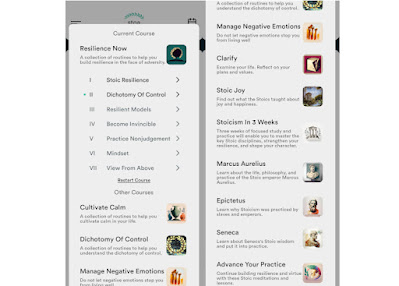Stoicism: Stoa App Review
Review by Casey Douglass
The philosophy of Stoicism gained its name by being taught on the “painted porch”, or stoa, in ancient Greece. It was a philosophy very much of the people, and its street-side nature was as open a way as any for passers-by to have their interest piqued. Stoa is a smartphone app that aims to bring Stoicism to our modern “digital streets”, in the hope that many more people might experience the benefits of the mindful Stoic outlook on life.
I won’t go too in-depth about what Stoicism is, save to say that the Stoic philosophy is very different to being small “s” stoic. The first is aware of the role that our value judgements play in everyday life, those things that we label as good or bad, and the way that these judgements affect our emotions. A Stoic wants to develop their character and to live well in the world. The latter tries to hide all external expression of certain emotions, and more than likely tries to repress them so that they don’t even feel them. The first is wise. The latter is a breakdown (or a meltdown) waiting to happen.
 |
| A brief look at some of the courses |
Stoa gives the user access to a whole host of meditations and teachings from the ancient Stoics, and it does this by letting the user digest concepts in small, manageable routines. Each day, the main page of Stoa will present your current lesson, broken down into a number of sections: A quote, the theory behind it, a meditation practice incorporating this idea, an invitation to make a commitment to practise, and a chance to note if you followed through. I really appreciated this layout, as often, any internal resistance towards starting the daily lesson was soon banished by even just reading the quote, a micro-action that takes all of a few seconds.
When I first started to explore the Stoa app, I also happened to slip into a severe period of depression (unrelated to using the app). Even though I’ve read about, and attempted to practise, Stoic philosophy for a decent number of years now, I still found myself struggling to muster the motivation to even look inside the app. This is where each lesson being broken down into tiny steps really helped, as I just tried to read the quote each day. Some days, once I’d read the quote, I saw that the theory audio was so short (often only a few minutes) that I thought I’d listen to that too. After this, I was almost half way through the lesson, although I often stopped when I got to the meditation section, as at the time, I couldn’t cope with some of those.
 |
| The Stoa App main page |
The meditations are really well done and helpfully give the listener some guidance with how to reflect on and digest the notions of the day. I did enjoy the more mindfulness-based ones but during my dip into depression, I found a good number of the meditations included elements that required me to think about a problem and to visualise it in a new way, such as how I’d most like to respond. This is valuable advice and direction but I just couldn’t do it while depressed; my mind couldn’t even grasp some of the concepts that I already knew at that point. I was just content to read my quote and listen to my lesson of the day.
When using Stoa, you aren’t restricted to the lesson of the day, there are all manner of other audio and written resources in the app. You can delve into various elements of Stoic theory, learn about the lives of the most well-known Stoics, such as Marcus Aurelius and Epictetus, and even listen to some brilliant conversations about Stoic topics, conducted between the Stoa team, or with other experts in the field. You can access some of these conversations at Stoa Conversations. I really valued listening to these conversations as they often branched out into other areas of life, such as creativity, how to deal with bullying, and with fake news. A good chunk of my “minutes” shown below came from listening to the podcasts.
 |
| My best month regarding my "streak" |
Stoa was created by Caleb Ontiveros and Michael Tremblay, two philosophy lovers who have come together to spread a little more Stoic wisdom in the world. While there are already some excellent books that break Stoic ideas down into day-sized chunks, Stoa really benefits from its digital form and the way that we nearly always have our smartphones close at hand. The mild gamification (streak counting) and the low-effort positive psychological principles in the app design (such as pressing a button to commit to your practice) all create a feeling of progressing, without hitting you over the head with too much. Stoicism is, after all, a life-long process, where repeated visits to a topic, with many periods of reflection, is usually needed to get said topic to travel from “head to heart” so to speak. From mere thought to knowing. Stoa makes this a pleasing, interesting experience and, even if I don’t keep those streaks going, I know it’s an app that I will return to again and again.
You can find out more information about Stoa on the website. Pricing details are below, and also links to the Apple and Google app stores. If you are interested in the app and genuinely can't afford it, you can also get in touch with Stoa who will give you a free account. You can find details about this on their website.
I was given free access to this app for review purposes
App Name: Stoa
Developer: Zeno Apps LLC
Platforms: Apple App Store & Google Play Store
Price: Free 7 day trial, then £8.99 / $9.99 per month or £46.99 / $69.99 per year.

